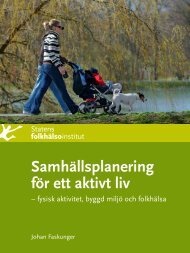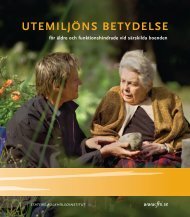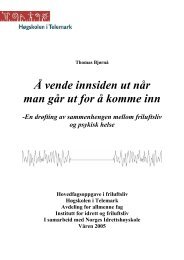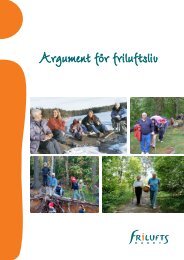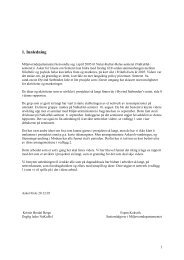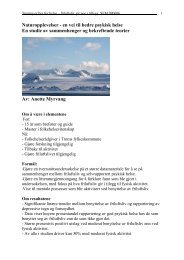Green Care: A Conceptual Framework - Frisk i naturen
Green Care: A Conceptual Framework - Frisk i naturen
Green Care: A Conceptual Framework - Frisk i naturen
You also want an ePaper? Increase the reach of your titles
YUMPU automatically turns print PDFs into web optimized ePapers that Google loves.
Spurgeon (2006) have described STH:<br />
“…as the participation by a range of vulnerable people in<br />
groups and communities whose activities are centred around<br />
horticulture and gardening. STH is distinct from domestic<br />
gardening because it operates in an organised and formalised<br />
environment.”<br />
4.4 Facilitated green exercise as a therapeutic<br />
intervention<br />
Historically, the beneficial effects of physical activity on physical health<br />
have been widely accepted. More recently, over the last 20 years, the<br />
positive effects on psychological health resulting from exercise have been<br />
examined. During this time there have been a number of research studies<br />
investigating the relationship between physical activity and mental health.<br />
For example, Dunn et al (2005) showed that a programme of aerobic<br />
exercise was effective in mild to moderate depression; and Sims et al<br />
(2009) found that exercise reduced symptoms of depression in stroke<br />
patients. A meta-analysis of 11 treatment outcome studies conducted<br />
by Stathopoulou et al (2006) demonstrated the beneficial effects of<br />
exercise. Also, Diaz and Motta (2008) found exercise to be useful in post<br />
traumatic stress disorder in a group of adolescents. These and other similar<br />
observations have led to the recognition of the potential of exercise as<br />
a therapeutic intervention, particularly for those suffering from clinical<br />
depression and anxiety (see, for example, Mental Health Foundation, 2005,<br />
2009).<br />
Around 21% of General Practitioners (GPs) in the UK now offer exercise<br />
therapy as one of their three most common treatment responses, in<br />
comparison to 94% who commonly prescribe antidepressants. For 45%<br />
of GPs antidepressants are their first response compared to 4% whose<br />
first response is to prescribe exercise therapy (Mental Health Foundation,<br />
2009). Whilst the use of exercise therapy remains relatively low, the current<br />
figures show a large increase in the past five years. Data published in<br />
2005 (Mental Health Foundation, 2005) showed that then only 5% chose<br />
exercise as one of their three most favoured options and less than 1% would<br />
consider it as their first response. Hence, the use of exercise therapy is<br />
slowly gaining ground in the UK.<br />
41




